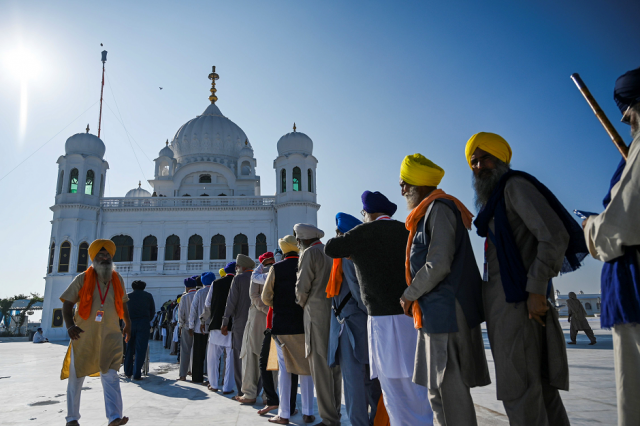India snubs offer to reopen Kartarpur
Pakistan wanted Sikh pilgrims from India to visit holy site from tomorrow after a gap of three months

Sikh Pilgrims stand in a queue to visit the Shrine of Baba Guru Nanak Dev at Gurdwara Darbar Sahib in Kartarpur, on November 9, 2019. PHOTO: AFP
The corridor was temporarily closed in March this year because of the outbreak of the Covid-19 pandemic.
“As the religious places are gradually opening up around the world, Pakistan prepares to reopen the Kartarpur Sahib corridor for all Sikh pilgrims, conveying to the Indian side our readiness to reopen the corridor on 29 June 2020, the occasion of the death anniversary of Maharaja Ranjit Singh,” Foreign Minister Shah Mahmood Qureshi wrote on Twitter.
To ensure adherence to the health guidelines, Pakistan has invited India to work out necessary standard operating procedures for reopening of the corridor, according to a statement issued by the foreign ministry.
“The Kartarpur corridor is a true symbol of peace and religious harmony. This landmark initiative by the government of Pakistan has been immensely appreciated by the Sikh community all over the world including India,” the statement read.
However, New Delhi was quick to reject Islamabad’s offer to facilitate the Sikh pilgrims, saying that cross-border travel had been suspended because of the coronavirus outbreak, Times of India reported.
India described Pakistan’s gesture as “a mirage of goodwill”. “Government sources said this would only undermine the bilateral agreement which required India to share information with Pakistan a week before the date of arrival,” the publication added.
The Kartarpur Corridor was inaugurated on November 9 last year by Prime Minister Imran Khan. The opening of the corridor on the eve of the 550th birth anniversary of Baba Guru Nanak, the founder of Sikhism, had fulfilled a long-awaited desire of Sikh devotees to visit his final resting place.
The corridor connects Dera Baba Nanak in India with Kartarpur Sahib, located just over four kilometers from the international border in Pakistan’s Narowal district.
The shrine houses the Samadhi, where Baba Guru Nanak was cremated, and a grave. The shrine is visible from the border and often Sikhs gather on the Indian side to perform Darshan or sacred viewing of the site.
Pakistan has as much as 150 of Sikhism’s holy sites mainly concentrated in Punjab and visited by the Sikh community from around the world.
Gurdwara Janam Asthan (also known as Nankana Sahib) near Sheikhupura — the Guru’s birthplace — Dera Sahab and Samadhi in Lahore, and Gurdwara Punja Sahab in Hasan Abdal draw millions of Sikh followers. Pakistan has restored over 20 such places of worship and is planning to renovate others.
Last year, a life-size sculpture of Maharaja Ranjit Singh was unveiled on June 27 outside the Sikh Gallery at Lahore Fort on his 180th death anniversary.
The statue was built and installed by the Walled City of Lahore Authority (WCLA) in collaboration with the UK-based Sikh Heritage Foundation, which funded the project.
The statue was made by artists from Lahore’s National College of Art and Naqsh School of Art under the supervision of Faqir Khana Museum Director Faqir Saifuddin. “This sculpture is a tribute and homage to the son of the soil,” Saifuddin said, adding that Lahore has had rich cultural and religious diversity for centuries and Ranjit Singh was one important part of it.


















COMMENTS
Comments are moderated and generally will be posted if they are on-topic and not abusive.
For more information, please see our Comments FAQ